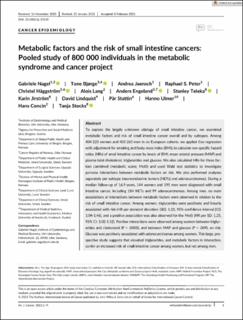Metabolic factors and the risk of small intestine cancers: Pooled study of 800 000 individuals in the metabolic syndrome and cancer project
Nagel, Gabriele; Bjørge, Tone; Jaensch, Andrea; Peter, Raphael Simon; Häggström, Christel; Lang, Alois; Engeland, Anders; Teleka, Stanley; Jirström, Karin; Lindquist, David; Stattin, Pär; Ulmer, Hanno
Peer reviewed, Journal article
Published version

View/
Date
2021Metadata
Show full item recordCollections
- Artikler [5068]
- Publikasjoner fra CRIStin FHI [7544]
Abstract
To explore the largely unknown etiology of small intestine cancer, we examinedmetabolic factors and risk of small intestine cancer overall and by subtypes. Among404 220 women and 403 265 men in six European cohorts, we applied Cox regressionwith adjustment for smoking and body mass index (BMI), to calculate sex-specific hazardratios (HRs) of small intestine cancer by levels of BMI, mean arterial pressure (MAP) andplasma total cholesterol, triglycerides and glucose. We also calculated HRs for these fac-tors combined (metabolic score; MetS) and used Wald test statistics to investigatepairwise interactions between metabolic factors on risk. We also performed analysesseparately per subtype (neuroendocrine tumors [NETs] and adenocarcinomas). During amedian follow-up of 16.9 years, 144 women and 195 men were diagnosed with smallintestine cancer, including 184 NETs and 99 adenocarcinomas. Among men, no mainassociations or interactions between metabolic factors were observed in relation to therisk of small intestine cancer. Among women,triglycerides were positively and linearlyassociated with risk (HR per standard deviation [SD]: 1.23, 95% confidence interval [CI]:1.04-1.46), and a positive association was also observed for the MetS (HR per SD: 1.25,95% CI: 1.02-1.52). Positive interactions were observed among women between triglyc-erides and cholesterol (P= .0005), and between MAP and glucose (P= .009), on risk. Glucose was positively associated with adenocarcinomas among women. This large, pro-spective study suggests that elevated triglycerides, and metabolic factors in interaction,confer an increased risk of small intestine cancer among women, but not among men.